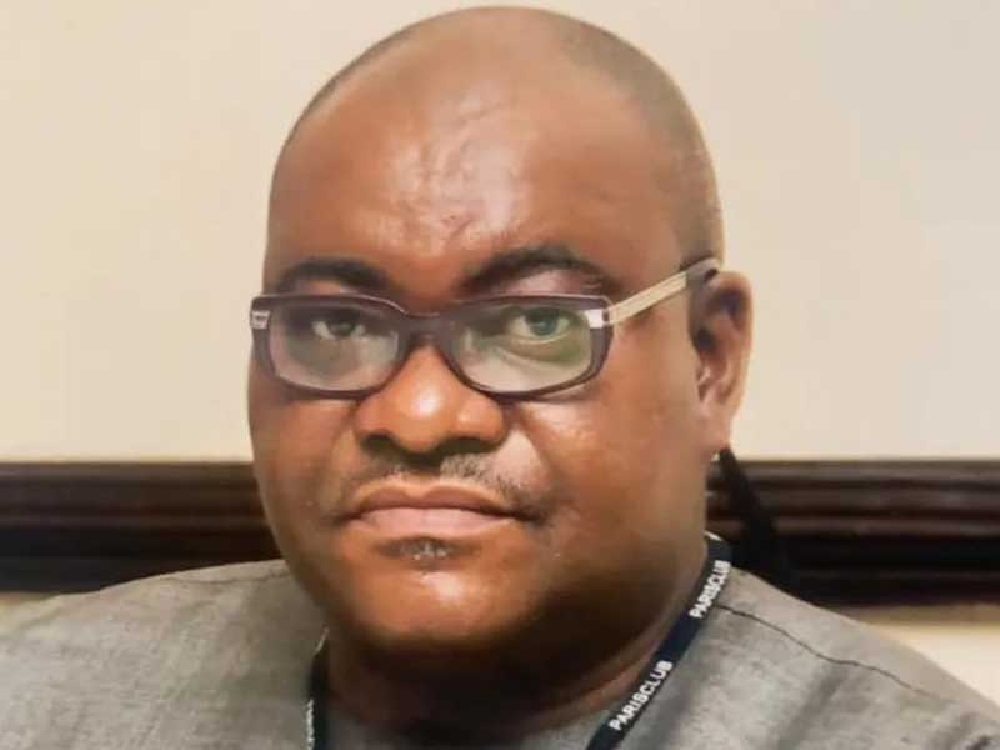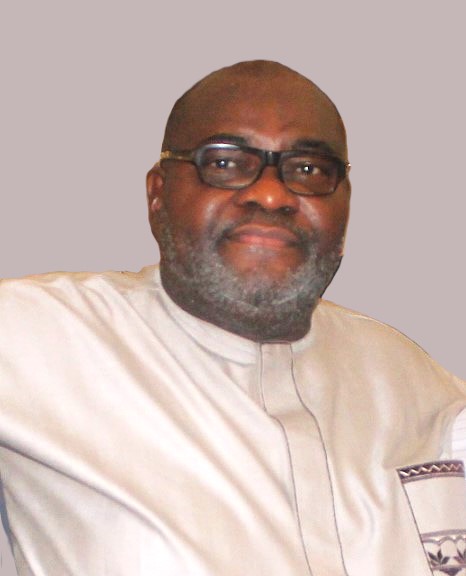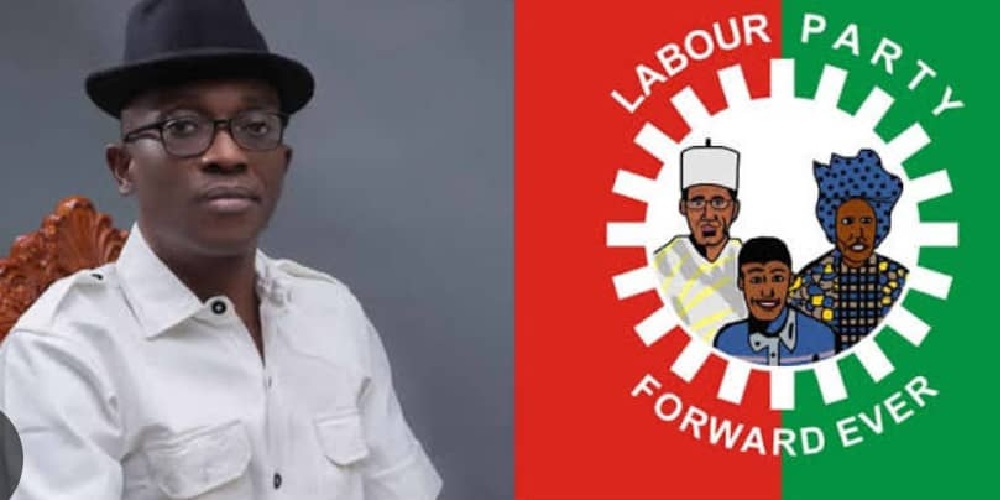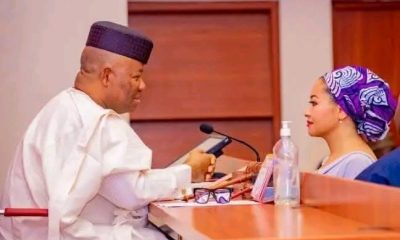Opinion
WAS IT THE BANKERS WHO TOOK AWAY OUR DOLLARS?

By Segun Sanni
Nigeria is a peculiar place where those who know absolutely nothing about a topic would be making outlandish claims on the topic with supreme confidence that would make even a subject matter expert green with envy. To this nameless author that made the rounds all over the social media in the past week, 99% of bank MDs and executives are thieves and they are the ones behind the ongoing economic and currency crises bedeviling Nigeria. He obviously took his cue from a similar erroneous claim by elder statesman, Chief Bode George, to the effect that bankers were the ones behind the collapse of the Naira. He even mentioned some names to personify the object of his anger but with tremendous respect, Baba only waxed very angry and emotional, pretty much symptomatic of the current mood in the land, widespread anger at the government and at anyone perceived to either contribute to or is not/less affected by the spreading hunger and general hardship in the country. It would not occur, neither matter, to them that bankers are not exempted from the national calamity and they almost compete in number with doctors, nurses and other healthcare professionals on the Japa exodus queues. But back to Baba George, he did not make ANY single valid charge against Wigwe or the other bankers that he mentioned in his diatribe, and I will try quote him verbatim:
“Emefiele, Elumelu, Adeola…all of them, stupendously wealthy now! Wigwe, who became MD of Access Bank immediately the other young man left, has now established a university. He has the temerity to be advertising that university on CNN. Wigwe University! That’s personally established by him! Where’s the money? Where’s his factory??Access Bank! What is the practice? They release dollars to them on monthly basis. They use the dollars! If it’s at 1 to 100, they will get it through the Mallam to say 1 to 200. You see that profit, what do they do with it? Who are the commercial people that really need it and get it? Most people get back to the Mallam to buy dollars. You hardly would get from the bank unless you are…Is that commercial activity?? So, what they had done to this nation, they must all be invited for discussion because the rottenness started from there, and it’s been going on for years! But it has exploded now on our faces!…”*
And let us do the analysis: a man who had a strong passion and track record for excellence came out and said he wanted to establish a world class university with international standard facilities and top notch foreign professors and university administrators to attract students from Nigeria and other African countries who ordinarily would have been targeting European and American universities. And we knew this guy to be an unbeatable go-getter who had the uncommon grace to achieve virtually all he set his sight on, where should we expect him to advertise the culmination of his dream project and to invite students? On Radio OYO or LTV Channel 8??? We’re so used to things not working around here that we forget this school could be, or could have been, a major source of pride, prestige, foreign exchange, profit and academic prowess to our country! Are we aware of how much revenue and foreign exchange British universities attract to Britain every year? Recently, I read a report that British universities made £5.4bn from overseas students in 2015-2016 academic session (one session) but the same figure had grown 71% to £9.7bn (about N20 Trillion which would equal Nigeria’s one year debt-funded budget) by the 2021-2022 academic session, amounting to 21.5% of all incomes earned by the universities in the same year. This is a huge source of income/liquidity aside the attendant spillover effects on housing, food, tourism and general aggregate demand in the economy from the influx of international students. Why do we believe we cannot replicate the same here, at least from within the African region?? Are we going to reach Africa through NTA Channel 7?
Now back to Baba’s charges: 1. That bankers make their profit from selling and round tripping foreign exchange! 2. That Nigerians don’t get dollars to buy in the banks bcs the bankers have sold the dollars to Mallams??? Haba!!! Do you know of any industry that is as strictly monitored and regulated in Nigeria as banks?? If you know one that comes close, please mention it here. The Central Bank has a whole Banking Supervision (and Examination) Department, headed by a Director and a coterie of banking experts and auditors whose jobs would also be on the line should they fail to spot and report any infractions or violations or red flags which later became an issue or got discovered after their visit. CBN is almost overbearing on the banks and is always on their backs, issuing circulars and directives with threats and actions of serious penalties and consequences should there be a violation. Some in our midst think the CBN just allocates dollars to the banks to disburse as they deem fit and the banks then take the dollars to the Mallams. But that is not how things work. Every dollar that the CBN releases to the banks is backed by an actual transaction with a customer completing and signing the forms (sometimes electronic forms) and with the funds released directly to the eligible destination depending on the nature of the transaction. Every dollar the CBN releases to the banks is tied to a customer request and can be easily traced and confirmed in the customer’s account. And the customer’s foreign exchange transactions can be traced across all the banks because the accounts are all connected to a BVN.
From the above, the allegation that Nigerians don’t get dollars from the banks is a very false and unfair allegation. There was no big problem with dollar funding for eligible transactions until our economy was grounded by serious mismanagement and dollar flows dried up in the economy. It is not the making of the banks. The banks do not print or manufacture dollars. Is there anyone here who travelled abroad three to four years ago and couldn’t buy PTA dollars from his banker and had to buy from Mallams?? Is there anyone here whose child attended school abroad up till about four years ago and didn’t get dollars/Pounds from the banks and had to buy from Mallams?? Is there anyone here whose business opened an LC up to four years ago and whose bank would not remit the FX and had to buy from Mallams?? It was only recently that the sh.t hit the fan and the utter mismanagement and complete grounding of our economy became a crisis where the system ran out of dollars. The fact is that the system ran out of dollars, and not that the bank MDs gave the money to Mallams.
The question of “where is your factory?” is a rather old fashioned, almost archaic, way to look at business and wealth in today’s world. In the years leading to the 18th to early 19th centuries, farming was the way to make money for most people and the guy who had the biggest farm and the most number of people on his farm was the wealthiest guy, and that was the main reason behind inter tribal warfare and slavery, the quest for manpower. Later on from around the 1820s, the engine was (re)invented and there resulted the Industrial Revolution. With that came the tractors, etc and the resultant less need for human hands (a tractor would do in thirty minutes what hundred men would do on a farm in a whole day). That was one of the big reasons behind the abolition of slave trade. And with the Industrial Revolution came a new need, the need for large scale raw materials to feed their factories, and that was the big basis for colonialism and the Partition of Africa.
The rich people were then the industrialists, those who owned factories. Those were the days of the Rockefellers (oil), the Carnegies (steel), the Fords (automobiles), the Vanderbilts (rail and shipping), etc. And after the World Wars and with the emergence of economic and political stability, the global population grew tremendously and the products and services to sustain the large populations were then the focus. And that is the background to the question of “where is your factory?” whenever they would investigate how people made money. The industrialists were the champions of those days, just as the plantation owners before them, but the world has evolved and the needs of the ever growing world population have also evolved. Technology (including telephony), banking and logistics have emerged very strongly and have become the dominant businesses in today’s world. As at 1990, the 20 largest global companies were:
1 General Motors
2 Ford Motor
3 Exxon Mobil
4 Intl. Business Machines (IBM)
5 General Electric (GE)
6 Mobil
7 Altria Group
8 Chrysler
9 DuPont
10 Texaco
11 ChevronTexaco
12 Amoco
13 Shell Oil
14 Procter & Gamble
15 Boeing
16 Occidental Petroleum
17 United Technologies
18 Eastman Kodak
19 Marathon Oil
20 Dow Chemical
Source: S&P 500.
But the tech companies have taken over in the past decade. Today, the tech companies are the global giants. The top ten largest companies in the world in 2020 are:
- Apple Inc
- Microsoft Corp
- Alphabet Inc
- Amazon
- Berkshire Hathaway Inc
- Ali Baba Group
- JP Morgan Chase
- Tancent Holdings Limited
- Visa Inc.
These are mostly new/young companies which came in and took centre stage way beyond the global players of the past.
In most countries of the world today, the largest companies are the tech companies, the phone companies, the banks and the oil companies, not the factories.
In all of history, an economic crisis always leads to mass anger, resentment and frustration with the government, the wealthy and even with many in the middle class. Baba is only expressing similar frustration but those of us who know should not join in those claims which have no foundation at all. How can anyone claim to miss the obvious and unusual entrepreneurial passion, courage and the can-do spirit bristling in and driving Herbert and Aig? How can one imagine it’s CBN’s FX that would be behind a Nigerian bank being one of the largest banks in Africa and building sizable subsidiary businesses in the UK, US and China aside its tentacles in the African continent?? Even if all of Nigeria’s meagre FX was given to Access Bank alone, how much would that amount to?? If that was how easily CBN dollars were available for banks to corner and make huge profits upon, why have we had so many bank failures in Nigerian history? Are you aware that many more banks have failed in Nigeria than survived?? Or dollars just became available in the banks when Herbert and Aig set up their bank?
Now please note, young folks are also operating and making waves in the Fintech world today, the Flutterwaves of this world. They’re filling a gap and rendering much needed payment services and are making good money, legitimately. We better get used to them and pray that our children be like them and the successful clean bankers.
I pass no judgment on the Access-Intercontinental Banks acquisition issue which has also been beaten to death in the social media since Herbert died. I have not the full details to make a fair judgement, but on this claim that it’s banks not allowing you to get dollars, I say fa…fa…fa…foul, in the voice of Pa Zebrudayah Nwogbo, alias 430. 
And if you care to know what led us to where we are, they’re three or four main things. Let me quickly summarize them:
- The last government borrowed huge sums of money domestically and internationally. We mostly don’t know what the loans were spent upon. Nigeria is currently spending over 50% of dollars accruing to us on servicing the debts that we cannot account for.
- Unprecedentedly large volumes of Nigeria’s oil was stolen between 2021 and 2023. At a point, we were losing up to 1m barrels of oil DAILY with the government not raising any alarm and with no one arrested so far. Dollars were not coming in to Nigeria bcs the remaining oil that was not stolen, NNPC took the proceeds as “petrol subsidy” recovery.
- From the above, the government started printing/taking illegal empty money from the CBN, money that merely expanded the monetary base and was not backed by any production. At the last count, over N25 Trillion was so printed. Our leaders apparently did not watch “The Rise and Fall of Idi Amin” in the 1970s. How can we repeat this error in today’s world??
3a. This primarily is the source of the serious inflation that we’re experiencing in Nigeria apart from food shortages arising from weather and insecurity.
3b. In a staggering error that begs for explanation, the CBN kept trying to tackle the inflation by raising the interest rate rather than cut the source of the problem, the illegal money being printed for the government. This raised interest rates for the productive sectors of the economy and crowded them out of the loans market.
3c. The illegal money so printed and which expanded the monetary base (money supply) of the economy is also joining other (existing) monies to chase for fx (some even allege the politicians are using the empty money to buy FX). - In continuation of the reckless borrowing and spending which defined the last government, they had also taken loans and pledged future oil production as payment source. So, much of the oil we’re producing today, the money is not coming in as it is being used to service those debts.
Numbers 1,2 and 4 above contributed to deplete our foreign reserves while number 3 led to/aggravated inflationary and fx pressures. For the first time in history, oil prices have been high in the past two years since Putin attacked Ukraine but Nigeria is broke in the period of oil boom. Unprecedented but it is what it is.
From the above, do you still think it’s the banks taking your dollars and selling them to Mallams?? Why is CBN not arresting them and flooding the market with dollars?
Please ‘hep’ me ‘on’ television make I watch Pa Zebrudayah. 
-Segun Sanni is an ex-banker and trouble maker in the Ibadan-Lagos axis of political and economic conversations.
Opinion
INSPIRING TAKEWAYS AT TUNDE OLUSUNLE’S DIAMOND SOIREE

BY BOLAJI AFOLABI
Oftentimes, it’s always challenging to organize commemorative parties for those who have distinctions in this pastime. Dr. Tunde Olusunle, Adjunct Professor of Creative Writing at the University of Abuja; recently re-named Yakubu Gowon University is one of the few masters in the game. Over the last two decades of close relationship with him, he has played massive roles in organizing parties for people. Call him a highly-rated events planner, you may not be wrong. He is not the usual, typical party planner around who has taken up the vocation as business. Olusunle does this for people dear to him; friends, bosses, colleagues, associations, communities, and more pro bono. At any of these occasions, he throws everything towards making the event successful. He invests his time, intellect, organisational savvy, and personal resources; months, weeks, and days to make the event grandiose. Some of his close friends eulogized his dexterity, expertise, and capacities in single-handedly coordinating parties, events, and other celebrations.
The writer, cognisant that Olusunle will mark his birthday in the month of March, was somewhat worried. Why? This year’s birthday was different, as the multi-tasking professional will climb “six stairs” and join the unique club of 60. So, who will coordinate a befitting birthday shindig for the “master organizer?” Can such match the quality of similar others that Babaeto; one of his titles, and moniker loosely translated as “Chief Organizer” has arranged for people? How can the standard set by him be met, if not surpassed? Still pondering, a thought came to mind. Given the national economic crisis that has led to accentuating poverty, staggering hyperinflation, disabling unemployment, corrosive hunger, and more, Olusunle; who is ever conscious of situations around him, may spring surprises. He may opt for simpler and modest celebrations.
About two weeks to d-day, an e-invite forwarded to the writer confirmed one’s thought. The card was beautiful in colours; aesthetic in design; and unique in words. Having close similarities with Babaeto’s imprimatur, it read, “please join us for drinks, bites, and laughter as we commemorate the Diamond Birthday of our father, husband, brother, and good friend; Tunde Olusunle ……” Further checks confirmed that the event was packaged by Dr. Funmi Olusunle, with Aramide, Yomi, and Tobi; wife and children of Babaeto was to be a modest gathering of people. On this, the “plotters” scored a bull’s eye. Surely, Olusunle will be excited that his ever-loving, dependable, and reliable better-half of over three decades, and scions are gradually “edging him out” in the plotting, planning, and execution of numerous surprise parties for people.
The weather on Sunday, March 30 was clement and friendly, away from the scorching sun of the previous day. This was the first surprise while heading to the event. Driving through the Gaduwa-Lokongoma axis of the capital city, the writer had another round of pleasant surprises. Making a detour, vehicular movements to the Estate gate; which was over 400 meters away, gave an idea of what to expect. After “snaking and snailing” through the entrance, which was about 100 meters to the residence, it became clear, and evident that this may not be a small event, as originally planned. The writer, struggling for a comfortable parking space, recalled what Pastor Tumo Ojelabi; a retired Director, Federal Ministry of Information earlier said, “Oga is a friend to all. It is almost impossible to have a small party to mark his 60th birthday. Many people will attend the event, either invited or not.”
Scheduled to officially commence by 5 pm, the programme was up and running an hour before. Given the elaborate preparations for any eventualities, the early arrivers were treated to a collage of bites, drinks, and soul-lifting songs. In between, there were memorable photo sessions on the lush green carpet emblazoned with Olusunle’s very visible portrait properly affixed. As the day progressed, more people made their ways to the beautifully decorated outer foyer of the celebrant’s residence. Hearty exchange of pleasantries, excited high-fives, warm embraces, friendly hugs, and more swept the entire atmosphere. The lively gathering was an admixture of grandparents, fathers, and mothers. Not forgetting the youths, and children. Typical of Olusunle’s enviable virtues of accessibility, humility, humanity, and inclusivity, guests and attendees cuts across different strata of the society.
With Yomi standing-in for the day’s master of ceremonies, (MC), the programme commenced a few minutes past five in the evening. Pastor Omotoba of the Redeemed Christian Church of God, (RCCG) offered the opening prayers, which was brief and impactful. Yomi, as the fill-in compere did a good job, as she was able to galvanize the audience with few jokes, gesticulations, and puzzles. Perhaps sensing the bulk of the happy guests were in their 40s to 60s, she requested for the rendition of early-school rhymes in the 1970s to late 1980s. Masterstroke! Led by a few ladies, the entire place came alive as it brought back nostalgic memories. Thereafter, the MC took over. Aramide delivered a “love letter” that was full of emotions, inspiration, and gratitude. Tobi, the “baby” of the house, who is a strong supporter of English Premier League’s Manchester United was working behind the scenes to ensure the overall success of the birthday bash.
Virtually all those called to describe Olusunle in one word, used the opportunity to heap praises, prayers, and commendations on him. Dr. Tivlumun Nyitse, Associate Professor of Mass Communications at Bingham University, Abuja, confirmed that, “we have been friends for over 40 years. Over the years and decades, the relationship has grown from family to brothers. As I wish him a happy diamond birthday, I advise him to slow down.” Dr. Femi Ajisafe, an agriculture entrepreneur affirmed that, “we both joined, and started work as secondary school teachers somewhere way-off modernity in a rustic, and sleepy community in Kogi state over three decades ago. Happily, we have been together; and our respective families ever since.”
Saluting Olusunle’s resilience, Dr. John Olarewaju, former Director-General, Michael Imodu Institute of Labour and Development Studies, (MIILDS) revealed, “he is ever dogged, determined, and sacrificial. So committed and consistent with writing that he can do it anywhere.” For Dr. Clem Baiye, former Managing Director, Daily Times PLC, “Olusunle is a go-getter.” An obviously joyous and excited Madam Elizabeth Olusunle, Mother of the celebrant expressed appreciation to family members and friends, particularly Dr. Funmi Olusunle for her steadfast love, and consistent understanding of everyone. Mama, also prayed for her dear son. The session ended with an inspiring Yoruba rendition by Anuoluwapo Favour Fabiyi; a hugely gifted and brilliant teenager.
As the evening progressed, it was clear that the planned simple hoedown turned to a classy, high-energy reception laced with flair and flash. Evidently wrapped in panache, pomp, and pageantry. From meals to drinks, jokes, and more, the get-together had trappings of charm, elegance, and sophistication. The dazzles and allure literally arrested everyone all through. It was exciting, entertaining, and memorable. Filled with thrills, frills, grills, and much more. The night was filled with revealing stories and engaging reminiscences that will be inspiring takeaways for many people. The excellent dishing and mixing of “old school” songs got many; including the writer either humming the lyrics, shaking heads, moving bodies or hitting the dance floor.
Indeed, the quality and quantity of guests who came to honour Olusunle; at short notice was a worthy testament of the recognition and acceptability of the celebrant as a “peoples man.” The roll call of personalities was large. Chief Onyema Ugochukwu, pioneer Chairman, Niger Delta Development Commission, (NDDC), and his lovely wife, Dr. Joyce Ugochukwu; AIG Tony Olofu, (Rtd), and wife, DIG Rhoda Olofu; Hon. Leke Abejide, Member representing Yagba Federal Constituency, and his wife were there. Dr. Boboye Oyeyemi, former Corps Marshall, Federal Roads Safety Corps, (FRSC); Pastor Tunde Ipinmisho, former General Manager, Public Affairs, Federal Housing Authority, (FHA); Prof. Sunnie Ododo, former Chief Executive Officer, National Theatre. Dr. Emmanuel Ikpeme, Deputy Secretary-General, Nigerian Football Federation, (NFF); Chief Femi Melefa, consultant and entrepreneur; Pastor Yomi Babaniyi, and wife, and many others graced the occasion. Not forgetting Hon. TeeJay Yusuf, and Deputy Corps Marshall Clement Oladele, who were out of the country and Abuja respectively, but extended their congratulatory messages to Olusunle.
As the elegant soiree spread late night guests had more to savour. Properly garnished, sumptuous delicacies, refrigerated drinks, and eye-popping small chops flowed endlessly. Undoubtedly, the knees-up; according to the British were exhilarating and enthralling. For many, the event, turned out to be a worthy, timely rendezvous of sorts. There was a reunion of old friends; re-kindling of friendships; and building of new networks. Many agreed that it will be an unforgettable experience.
* BOLAJI AFOLABI, a Development Communications specialist was with the Office of Public Affairs, The Presidency, Abuja.
Opinion
CELEBRATING A PRODIGIOUS WORDSMITH: TUNDE OLUSUNLE @ SIXTY

BY BOLAJI AFOLABI
Poring over countless title-ideas for this article, the above emerged from the blues. Further checks about the subject confirmed the title as fit and proper. Describing Tunde Olusunle as a “prodigious wordsmith” is no exaggeration. In every of his work, he comes across as one who has vocabulary virtuosity, and endowed with narrative mastery. He displays unimaginable linguistic dexterity which is intertwined with rhetorical flair, and imbued with creative vision. He carves the right words, and descriptive styles to paint beautiful scenery of complex and cumbersome situations. He crafts, engages, and suspends readers till the last words are happily soaked in. So, the title is both deliberate and intentional.
Dr. Tunde Olusunle, an Adjunct Professor of Creative Writing at the University of Abuja; which was recently re-named Yakubu Gowon University, is a man of many parts. He is a celebrated journalist; author; poet; communicator; and public speaker. Thus, he fits into all the fields where intellect, elucidation, and erudition coalesce. As a Columnist and Editor, he rose to the top of Journalism. In Literature, aside from having degrees, he has many published (and yet to be published) poems. He has written, co-written, edited, and co-edited over a dozen books; earning the Fellowship of the Association of Nigerian Authors, (FANA). In the last few years in academia, he is making exceptional accomplishments as a scholar, teacher, and researcher nurturing and mentoring a new generation of creative writers.
Sometime in the ’90s; during the Late General Sani Abacha regime, the writer went to the Saka Tinubu, Victoria Island, Lagos office of an elder brother; Ade-Ralph Olamife. After late lunch at the classy canteen within the precincts of the Nigeria Telecommunications Limited, (NITEL) offices, the host extended an invitation. He said, “I want you to join me later today to meet a friend coming from Ikeja.” About 7 pm, we (Olamife, two other friends, and the writer) drove into Bishop Oluwole Street in Victoria Island, Lagos. The building was the Kogi state Liaison Office at that time. Surprisingly, the august friend, who came with another person was already seated. After the exchange of pleasantries, the subject of this article was introduced by Olamife. Olusunle, who came with Alhaji Hakeem Bello; later Media Adviser to Babatunde Raji Fashola, (SAN), interacted freely with everyone. During the over two hours sit-out, Olusunle came across as a witty, lively, intelligent, and brilliant personality.
After this first meeting, the writer; through Olamife had subsequent interactions with Olusunle in Ikeja, Maryland, Ikoyi, and Victoria Island areas of Lagos. On every occasion, he exudes confidence and accessibility just as his humble and humane attributes come alive. After over a year of gap, largely due to the analogue communication state, and his relocation out of Lagos, Olamife broke the cheering news of Olusunle’s appointment as the Chief Press Secretary to the Kogi state Military Administrator; Col. Paul Omeruo. A few months later, the writer accompanied (as usual) Olamife; to visit Omeruo in Lokoja. By the way, both Olusunle and Olamife are mutual friends to the Administrator, fondly referred to as PUNO; initials of his names. During the two-week visit, Olusunle was the perfect host; he made every evening eventful and memorable. From discussions, many civil servants spoke glowingly about him. In and around the Lugard House; Administrator’s residence and office, as well as Ministries, Departments, and Agencies, (MDAs), his interpersonal relationships were eulogized. Succinctly, he could be described as a people’s man.
With the birth of democracy in May 1999, and the inauguration of Chief Olusegun Obasanjo as the President and Commander in Chief of Nigeria, the writer partially relocated to Abuja, hoping to explore opportunities in the new government. Watching the Nigerian Television Authority’s flagship news, the advert inviting people to the official launch of the new administration’s “Campaign for National Rebirth” sounded interesting. The writer made his way to the purposely-built Eagle Square venue of the event. As the programme progressed, the presence and importance of Olusunle was very evident. Events over, the writer swiftly moved from the stands down the platform to offer salutations to him. Pushed, shoved aside by over-zealous security operatives, it was a herculean task. At the point of giving up, an incident happened which diverted the attention of almost everyone. Leveraging on this, the writer made his way to the dais. Standing before Olusunle, he called the writer’s name, hugged, and exchanged pleasantries. Quickly, he said, “I’ll be out of Abuja for one week, meet me at Sheraton Hotels next week please.”
The writer’s visit to Sheraton Hotels marked the beginning of a relationship that has grown in leaps and bounds. Either at the Hotel’s Papillon Restaurant or the Poolside Bar, and Nicon Noga (now Transcorp) Hilton Hotel, the compassionate, empathetic, and accommodating attributes of Olusunle always come to the fore. They were unmistakable and unequivocal. During one of the numerous visits, he requested for the writer’s curriculum vitae; without saying what he wanted to do with it? It was discovered, early that he loves working behind the scenes. Beneficiaries of his advocacy, and benevolence only get to know when “food don done for eating.” One recalls on a visit to his 7th floor, Sheraton Hotels “temporary official residence” he beckoned on the writer to accompany him to somewhere. In a few minutes, we were in one of the suites at the Hilton Hotel, only to see Chief Onyema Ugochukwu, emeritus journalist, and public administrator walked in. With shock, suspense, and excitement written on one’s face, Olusunle introduced the writer saying, “Oga, this is one of our younger but silent supporters.”
A few months later, the import of that visit came to light. Through the persistent advocacy, and resilient prodding of Ugochukwu and Olusunle, President Obasanjo gave approval for major recruitments to strengthen the rebirth campaign, and public affairs management of the new government. So, the writer and other people benefitted from a forward-thinking proposal that was primarily targeted at media professionals who were part of the Obasanjo presidential campaign organization. Pastor Tumo Ojelabi, a retired Federal Director who was one of the beneficiaries declared that, “Oga, is a fastidious personality, a determined helper who can be positively stubborn, and dogged when pursuing a course that he has strong conviction about.” Continuing, Ojelabi, who was the official Photographer to Obasanjo during the presidential campaign said, “but for his resilience, courage, and never-quiver spirit; and Oga Ugochukwu, many of us who toiled during the campaigns would have been left dry.” For Mr. Taiwo Akinyemi, who was Obasanjo’s campaign Official Videographer, “Olusunle is a fighter; a dynamic fighter for other people. When he realized that politicians who did not contribute much to Baba’s electoral success were getting their loyalists into the new government, he fought relentlessly for us all. God used him to get me employed in the federal civil service, I remain eternally grateful.”
Olusunle is a pan-Nigerian, totally detribalized, and not given to ethnicity, religious segregation and similar stereotype. Described by close friends as diligent, dedicated, and devoted to friendship, Olusunle remains a restless and tireless quester for knowledge and new challenges. Given his multi-dimensional, and multi-tasking skills and proficiencies, he can excel in whatever profession, assignment, and position. Energized by his voracious search for new ideas, he is almost, always thinking out of the box. Very ingenious, creative, and imaginative, one recalls few initiatives that came from his fertile mind during the Obasanjo presidency. Persistent encouraging words about Nigeria’s sports which led to the inclusion of the “sports brief” to his schedules. Advocacy for the hosting of the Commonwealth Heads of Government Meeting, (CHOGM) at any of the nation’s resorts; which informed him leading a team of journalists, tourism experts, and bureaucrats to the Yankari Games Reserves in Bauchi. What about the National Media Tour, though initiated by him but hijacked by a few top government officials who at the end muddled the entire programme?
Corroborating, Mr. Vincent Oyefeso, a retired Federal Director, and another beneficiary of the Obasanjo appointments approval, said, “he is an illustrious Nigerian and a patriot per excellence, who bestrides many walks of life as an intellectual collossus, a humanist of no mean hue, and an advocate of the finest social ethos. At the realms of public communications, the academia, and public service, he exudes the best practices worthy of emulation by right-thinking compatriots.” For Mr. Ukadike Uwabor, a media communications consultant, “since I’ve known him, he has remained consistent with the core values of excellence, versatility, and intellect. He relates perfectly with different people no matter the age, religion, tribe, or social status. Little wonder his friends cut across different strata of the society. That the people of Umukabia autonomous community in Abia state conferred on him a chieftaincy title; which is outside his geographical, ethnic, and linguistic zone speaks volumes about his personality.” Olusunle by the way, has few other titles bestowed on him in different parts of the country.
Agreed, no human being is perfect but the writer has personal experiences about Olusunle that remains nostalgic. Indeed, the over two decades relationships have grown from one stage to the other. From boss to teacher, mentor, and motivator. He has played (and continues to play) different roles in one’s professional development, and career progression. Perhaps, he may not realize this; while working with him, Olusunle doesn’t attend meetings alone. The writer, Late Alhaji Wasiu Anjous, and (on few occasions) Akinyemi accompanied him to any meeting, particularly with MDAs. Another striking feature was that he introduced you as a “colleague.” With that, one’s stock, respect, and recognition increases. One of the fall-out of such remarkable style happened at the 2004 Olympics Games in Greece, when Late Mr. Solomon Matankari, Nigeria’s Chef de Mission, and Sports Ministry’s Permanent Secretary insisted on the participation of Anjous and the writer in high-level meetings.
Not persuaded by the hierarchical structure of the civil service, Olusunle places premium on availability, delivery, and consistency. Just a few months after being deployed to his office, the writer had a baptism of fire. Barely 48 hours after one of the regular presidential chats, Olusunle passed the recorded tape, and declared, “do transcribe and deliver in three days.” Sensing shock, and surprise, he encouraged, “you can do it, go at your pace.” On another occasion, a few days after commending the writer on a piece, “From Saw Dust To The Skies,” he said, “write a speech for Dr. Mrs. Kema Chikwe, the Aviation Minister, for a programme this Saturday to be held in Garki, Abuja.” Though tough but exciting, it marked my entry into the exclusive class of speech writers; till this moment. Sometime in 2023; after long hiatus from opinion writing, due to a new assignment at the National Assembly, the writer did a piece. Impressed, Olusunle called immediately, “BJ, I’ve just read your brilliant article. I encourage you to make this more regular, please. I’m available to offer any support where and when necessary.” Truly, he has kept faith to his promise in the over thirty articles written between December 2023 and now.
This is the man we are celebrating today, and always. Olusunle is an extremely organized personality, whose writings and interventions are laced with irrefutable data, educative instances, and inspiring suggestions. When occasions demands, you can’t help but applaud his depth of knowledge, information reservoir, deep vistas, and un-ending capacity. Oyefeso prays that, “the Lord grants him peace as he steps into the sixth floor. The Father of Lights will continually uphold and uplift him from Glory to Glory in Jesus Name.” Mr. Jacob Zwings, aide to Director-General, National Orientation Agency added that, “Oga Tunde, in his own way has impacted positively on the lives of people. On the occasion of his Diamond jubilee, I pray that God will perfect everything that concerns him and his family.” Akinyemi declared that, “just as he has been a blessing to other people’s children, God will bless him, his wife, and children.” Uwabor believes that, “Enyi Oha has become a reference point to many people. The good Lord will grant him more years in good health as he age gracefully with abundance of all-round blessings.” Ojelabi affirmed that, “Olusunle is who he is today; an accomplished man who stands tall among his peers because of his commitment towards extending helping hands to those who needs it.”
* BOLAJI AFOLABI, a Development Communications specialist was with the Office of Public Affairs, The Presidency, Abuja.
Opinion
PROFESSOR HUMPHREY NWOSU: THE UNSUNG HERO OF TRUE NIGERIAN DEMOCRACY

Written by Dr. Nwambu Gabriel,Director General, Centre for Credible Leadership and Citizens Awareness
Introduction
The journey to democratic governance in Nigeria has been fraught with challenges, conflicts, and untold sacrifices. Among the gallant figures who stood resilient in the face of adversity was Professor Humphrey Nwosu. As we mourn the loss of a remarkable leader and an indomitable champion of democracy, we reflect on his contributions and unwavering commitment to the electoral process, which laid a foundational path for Nigeria’s democratic practice.
A Visionary Electoral Leader
Professor Nwosu’s tenure as Chairman of Nigeria’s National Electoral Commission (NEC) from 1989 to 1993 marked a pivotal era in the nation’s electoral history. Unlike many of his contemporaries, Nwosu approached his responsibilities with an unwavering resolve to uphold the sanctity of the electoral process. He successfully organized several elections, including Local Government Chairmanship, Governorship, and State and National Assembly elections, which were lauded for their transparency and fairness. His most significant achievement came with the conduct of the June 12, 1993, presidential elections, widely regarded as one of the freest and fairest elections in Nigeria’s history.
Courageous Stand Against Adversity
In an environment characterized by military interference and political manipulation, Nwosu exemplified courage. He boldly overturned a court order issued on June 10, 1993, that sought to halt the presidential elections. Despite facing intense pressure from the military establishment led by Ibrahim Babangida (IBB), he remained resolute, emphasizing his commitment to ensuring that the elections were conducted as planned. His insistence on completing his mandate, even when his commission was dissolved midway through the electoral process, is a testament to his integrity and dedication.
His unyielding stance culminated in the announcement of results from 29 out of 30 states in the June 12 elections. Although General Ibrahim Babangida annulled the elections before Nwosu could declare the final results, his steadfastness demonstrated his belief in the democratic process and the necessity of honoring the voice of the Nigerian electorate.
Championing Democracy Through Documentation
Professor Nwosu did not allow the annulment of the June 12 elections to silence his voice. In his book, *Laying the Foundation of Nigeria’s Democracy: My Account of June 12, 1993 Presidential Election and Its Annulment*, he chronicled the events leading to the election and its aftermath. By publishing the results of the June 12 elections, he presented irrefutable evidence of MKO Abiola’s victory, reinforcing the notion that the people’s will should prevail over political machinations. This documentation serves as a historical account of a significant moment in Nigeria’s struggle for democracy and a rallying cry for future generations.
Legacy of Integrity
As we reflect on Professor Nwosu’s life and contributions, it is essential to recognize his legacy of integrity, bravery, and unwavering commitment to democratic principles. He stood as a beacon of hope during a tumultuous period in Nigerian history, proving that one individual’s resolute stand could indeed lead to monumental change. His story serves as an inspiration to current and future leaders to prioritize the will of the people over personal or political gain.
Conclusion
The passing of Professor Humphrey Nwosu is not just a loss to his family and friends but to a nation that desperately needs champions of democracy. His actions during the critical moments of June 12, 1993, solidified his place in history as a true man of democracy. As we commemorate his life, we are reminded that democracy thrives through the courage and integrity of individuals like Professor Nwosu—those who are willing to stand firm against oppression and ensure that the voice of the people is heard.
May his soul rest in peace, and may his legacy continue to inspire generations to uphold the values of democracy, transparency, and justice in Nigeria.
-

 News19 hours ago
News19 hours agoJust in: Gunmen Hijack Loaded Bus,K!!ll Driver, Abduct Passengers
-

 News11 hours ago
News11 hours agoJUST-IN: Burkina Faso President Traore Reportedy Survives Another Assassination Attempt
-

 News15 hours ago
News15 hours agoDamaged reputation: Akpabio drags Abbo, Natasha to court
-

 News20 hours ago
News20 hours agoJust in: Supreme Court sacks ,Abure as LP chairman
-

 News20 hours ago
News20 hours agoTinubu’s Political Adviser, Baba-Ahmed Resigns
-

 News17 hours ago
News17 hours agoFamous Indian movie star, Manoj Kumar is dead
-

 News22 hours ago
News22 hours agoThere’s valid evidence of Akpabio sexually harassing me; I’ll release it, Natasha Akpoti-Uduaghan declares
-

 News12 hours ago
News12 hours agoUS Keenly Monitoring Edo Election Appeal Process Amid Concerns Over Transparency






